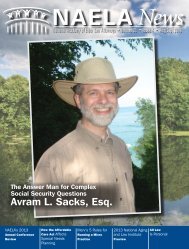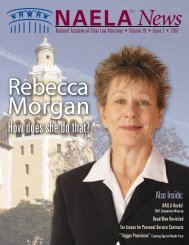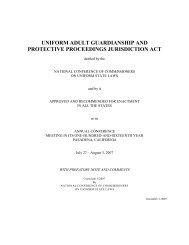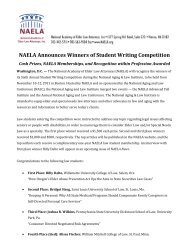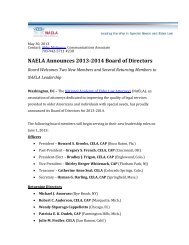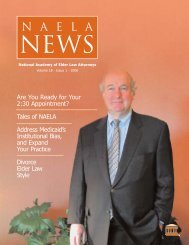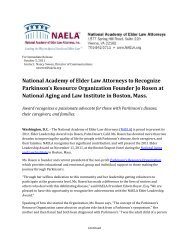NAELA News August, 1999 - National Academy of Elder Law ...
NAELA News August, 1999 - National Academy of Elder Law ...
NAELA News August, 1999 - National Academy of Elder Law ...
Create successful ePaper yourself
Turn your PDF publications into a flip-book with our unique Google optimized e-Paper software.
<strong>NAELA</strong> <strong>News</strong> ● <strong>August</strong> <strong>1999</strong><br />
Noncitizen Eligibility For<br />
Social Security and<br />
Supplemental Security<br />
Income Benefits<br />
(continued from page 26)<br />
child” definition under Department<br />
<strong>of</strong> Justice guidelines.<br />
The only nonqualified aliens who<br />
continue to be eligible for SSI are<br />
those who were “receiving” SSI as<br />
PRUCOLs on <strong>August</strong> 22, 1996. 8<br />
2. Step Two: Which Qualified Aliens<br />
Are Eligible for SSI?<br />
Being a “qualified alien” alone does<br />
not meet SSI eligibility criteria for<br />
noncitizens. The immigrant must be<br />
a qualified alien and meet one <strong>of</strong> the<br />
five categories as set forth in the<br />
PRWORA and the BBA:<br />
● Time-limited exception for refugees,<br />
etc. Persons who enter the U.S. as<br />
refugees, who are granted asylum,<br />
and whose deportation has been<br />
withheld under § 243(h) <strong>of</strong> the<br />
Immigration and <strong>National</strong>ity Act<br />
(INA) are eligible, but only for the<br />
first seven (7) years after the date<br />
that status is granted. 9<br />
● Veterans’ exception. An individual<br />
“lawfully present” in the U.S. is<br />
eligible if he or she is a U.S. veteran<br />
with an honorable discharge or who<br />
is on active duty. Also eligible are<br />
the veteran’s spouse, unremarried<br />
surviving spouse, or unmarried<br />
dependent child. 10<br />
● 40 quarters exception. A lawfully<br />
admitted permanent resident (LAPR)<br />
who entered the U.S. before <strong>August</strong><br />
22, 1996 is eligible if he or she (i) has<br />
worked 40 “qualifying quarters”<br />
(QQ) 11 or can be credited with such<br />
quarters and (ii) did not receive any<br />
federal means-tested public benefit<br />
during any quarter which begins<br />
after December 31, 1996. 12 If the<br />
LAPR entered the U.S. on or after<br />
<strong>August</strong> 22, 1996, the 40 QQ exception<br />
is available only after he or she<br />
has resided in the U.S. for 5 years. 13<br />
● Grandfatherees. Noncitizens<br />
lawfully residing in the U.S. and who<br />
were “receiving” SSI on <strong>August</strong> 22,<br />
1996 are eligible indefinitely. 14 The<br />
Social Security Administration (SSA)<br />
considers this group eligible under<br />
the more liberal pre-<strong>August</strong> 22, 1996<br />
law and rules. Thus, these individuals<br />
retain “grandfathering” rights<br />
even if benefits terminate for other<br />
reasons. 15 SSA uses the same<br />
regulation for determining “lawfully<br />
residing” as used in establishing<br />
Title II eligibility. 16<br />
● In the U.S. on <strong>August</strong> 22, 1996 and<br />
blind or disabled. Noncitizens<br />
“lawfully residing” in the U.S. on<br />
<strong>August</strong> 22, 1996 and who are blind<br />
or disabled are eligible. 17 SSA uses<br />
the same “lawfully residing” rules<br />
described above for Title II benefits.<br />
18 Once the “lawfully residing”<br />
requirement is met, the noncitizen is<br />
eligible if determined by SSA to be<br />
blind or disabled, regardless <strong>of</strong><br />
onset, age, or date <strong>of</strong> application.<br />
This category can be used for aged<br />
noncitizens (65 or over) who were in<br />
the United States on <strong>August</strong> 22,<br />
1996, but were not receiving SSI on<br />
that date.<br />
The chart below indicates possible<br />
categories <strong>of</strong> SSI eligibility depending<br />
on the date <strong>of</strong> entry into the United<br />
States:<br />
Conclusion<br />
Recent legislation has restricted noncitizen<br />
eligibility for Social Security and<br />
SSI benefits. While some <strong>of</strong> the more severe<br />
restrictions in the 1996 law were<br />
rectified by the 1997 BBA, many immigrants<br />
continue to be barred from receiving<br />
SSI. To represent noncitizen clients<br />
adequately, advocates should be familiar<br />
with the current eligibility categories.<br />
The <strong>National</strong> Senior Citizens <strong>Law</strong> Center is<br />
a public-interest law firm that specializes in<br />
the legal problems <strong>of</strong> older people. Their<br />
Washington, DC <strong>of</strong>fice can be reached at:<br />
(202) 289-6976; Fax: (202) 289-7224,<br />
and the Los Angeles <strong>of</strong>fice at (310) 204-<br />
6015, Fax: (310) 204-0891; e-mail:<br />
nsclc@nsclc.org.<br />
Endnotes<br />
1. Balanced Budget Act <strong>of</strong> 1997 (BBA), Pub. L.<br />
No. 105-33, 111 Stat. 251.<br />
2. Personal Responsibility and Work Opportunity<br />
Reconciliation Act <strong>of</strong> 1996 (PRWORA), Pub. L.<br />
No. 104-193, 110 Stat. 2105.<br />
3. PRWORA, § 401(b)(2). The PRWORA made<br />
this provision effective with applications filed on<br />
or after September 1, 1996. However, Pub. L.<br />
No. 104-208 extended the date to December 1,<br />
1996.<br />
4. 8 C.F.R. § 103.12.<br />
5. Pub. L. No. 105-33, § 5561, 111 Stat. 251, 638,<br />
codified at 8 U.S.C. § 1611(b)(3) (Medicare)<br />
and 1611(b)(4) (Railroad Retirement benefits).<br />
6. A “citizen” <strong>of</strong> the United States is a person born<br />
in the U.S., Puerto Rico, Guam or the Virgin<br />
Islands. Citizenship also may be obtained<br />
through naturalization. Persons born in<br />
American Samoa, Swains Island, and the<br />
Northern Marianas Islands are U.S. <strong>National</strong>s<br />
but considered “U.S. citizens” for SSI<br />
purposes. 20 C.F.R. § 416.1603.<br />
7. 8 U.S.C. § 1641.<br />
8. Pub. L. No. 105-306, the “Noncitizens Benefit<br />
Clarification and Other Technical Amendments<br />
Act <strong>of</strong> 1998.”<br />
9. 8 U.S.C. § 1612(a)(2)(A).<br />
10. 8 U.S.C. § 1612(a)(2)(C).<br />
11. For SSI purposes, earnings from work which<br />
are not creditable for Title II purposes may be<br />
used. POMS SI 00502.135.<br />
12. 8 U.S.C. § 1612(a)(2)(B).<br />
13. 8 U.S.C. § 1613(a).<br />
14. 8 U.S.C. § 1612(a)(2)(E).<br />
15. POMS SI 00502.100B.1.<br />
16. POMS SI 00502.100A.<br />
17. 8 U.S.C. § 1612(a)(2)(F).<br />
18. POMS SI 00502.142.<br />
ELIGIBLE CATEGORIES IF ENTERED BEFORE AUGUST 22, 1996<br />
Time-limited exception for refugees, asylees, etc.<br />
Veterans exception<br />
40 quarters exception for LAPRs<br />
Receiving SSI on <strong>August</strong> 22, 1996, i.e., grandfatherees<br />
<strong>Law</strong>fully residing in U.S. on <strong>August</strong> 22, 1996 and disabled<br />
ELIGIBLE CATEGORIES IF ENTERED ON OR AFTER AUGUST 22, 1996<br />
Time-limited exception for refugees, asylees, etc.<br />
Veterans exception<br />
40 quarters exception for LAPRs (after 5 years)<br />
27



